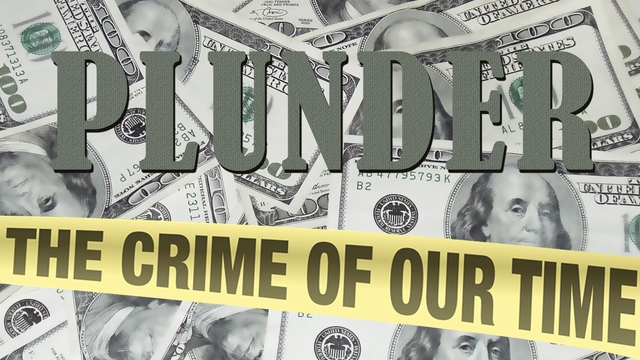Plunder: The Crime of Our Time
The financial crisis in 2008 was the end of the world as we know it. Eight years on, has anything changed?
 "I used to think of Wall Street as a financial centre. I now think of it as a crime scene." Journalist and filmmaker Danny Schechter, the self-proclaimed 'News Dissector' is relentless in his desire to bring to light the criminal practices that brought about an economic crisis whose impact has been so severe that, in the words of George W. Bush, it could be "greater than the great depression".
"I used to think of Wall Street as a financial centre. I now think of it as a crime scene." Journalist and filmmaker Danny Schechter, the self-proclaimed 'News Dissector' is relentless in his desire to bring to light the criminal practices that brought about an economic crisis whose impact has been so severe that, in the words of George W. Bush, it could be "greater than the great depression".
The conventional critique, that 'we are all to blame' for overconsumption by consumers and greed by financiers, is not enough for so many people who had their homes, livelihoods and retirements wiped out by the actions of a privileged and protected cadre of suits and ties. For those protestors descending on Wall Street, there is a real anger that nobody has been held responsible. Amid all their suffering, the banks and insurance companies continue to be bailed out to the tune of hundreds of billions of dollars.
Nomi Prins, a former investment banker at Bear Stearns and Goldman Sachs, has labelled the crisis as "the biggest crime in all time, in humanity." Why? Because the secrecy with which it was executed means we haven't yet quantified the depth of impact that it will have on the global economy. For Prins, the most dangerous aspect of the crisis is that the lessons have not been learned. 2008's crash will be followed "by another very profitable time, because the same people will still be involved in structuring the same types of things."
In Schechter's opinion, the media is squarely to blame for not holding those responsible for the crisis to account. Dean Starkman, a financial journalist with the Columbia Journalism Review, argues that the business press "did not really recognise and understand what they were up against, how dramatically the industry had changed…how out of control Wall Street had become". For any meaningful change in our broken economic system to occur, Schechter claims that the media "has to wake up, to shift the debate to include the need for deeper change and a crackdown on white collar crime."
PLUNDER tells this story of Wall Street run amok, with regulators enabling these crimes, and the press often looking the other way. It is a timely, informative and shocking account of trillions of dollars in losses and an America struggling to recover from a crisis that intelligence officials say poses a worse threat than terrorism. Featuring interviews from insiders - bankers, economists, politicians, lawyers, homeowners and more - Danny Schechter's crucial film weaves together the complexities of a shocking crisis that reveals the unimaginable scale of Wall Street's criminality.
FULL SYNOPSIS
Nomi Prins, a former investment banker at Bear Stearns and Goldman Sachs, has labelled the crisis as "the biggest crime in all time, in humanity." Why? Because the secrecy with which it was executed means we haven't yet quantified the depth of impact that it will have on the global economy. For Prins, the most dangerous aspect of the crisis is that the lessons have not been learned. 2008's crash will be followed "by another very profitable time, because the same people will still be involved in structuring the same types of things."
In Schechter's opinion, the media is squarely to blame for not holding those responsible for the crisis to account. Dean Starkman, a financial journalist with the Columbia Journalism Review, argues that the business press "did not really recognise and understand what they were up against, how dramatically the industry had changed…how out of control Wall Street had become". For any meaningful change in our broken economic system to occur, Schechter claims that the media "has to wake up, to shift the debate to include the need for deeper change and a crackdown on white collar crime."
PLUNDER tells this story of Wall Street run amok, with regulators enabling these crimes, and the press often looking the other way. It is a timely, informative and shocking account of trillions of dollars in losses and an America struggling to recover from a crisis that intelligence officials say poses a worse threat than terrorism. Featuring interviews from insiders - bankers, economists, politicians, lawyers, homeowners and more - Danny Schechter's crucial film weaves together the complexities of a shocking crisis that reveals the unimaginable scale of Wall Street's criminality.




